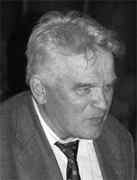Person: Faddeev (2), Ludwig

Ludvig Faddeev was a Russian mathematical physicist who worked in quantum field theory.
Mathematical Profile (Excerpt):
- When Faddeev was young he needed to make a difficult choice between pursuing a career in music or academia.
- When Faddeev began his university studies Joseph Stalin was Premier of the Soviet Union and people had to conform.
- Not long after Faddeev began his university studies he was required to appear before the local Comsomol (Communist Youth) Committee.
- As an undergraduate, Faddeev mostly enjoyed doing mathematics, especially analytical geometry.
- Faddeev was one of the first five people graduating from this course in 1956 being a student of Olga Alexandrovna Ladyzhenskaya and Vladimir Fock.
- Faddeev attended her courses on complex variables, partial differential equations, and operator theory.
- She organised special seminars and taught Faddeev how to work efficiently and she did not make him follow her route in mathematics, unlike many academicians forced their students, and she gave him full freedom in research.
- He attended Fock's course on general relativity but, although Fock had given quantum theory courses in the past, he was not lecturing on that topic at the time Faddeev was an undergraduate.
- Faddeev, however, was given a copy of Fock's lecture notes which he studied.
- Faddeev began publishing a series of important papers written in Russian: Uniqueness of solution of the inverse scattering problem (1956), On expansion of arbitrary functions in eigenfunctions of the Schrödinger operator (1957), An expression for the trace of the difference between two singular differential operators of the Sturm-Liouville type (1957), On the relation between S-matrix and potential for the one-dimensional Schrödinger operator (1958), and On continuous spectrum perturbation theory (1958).
- Even though he managed to solve a difficult problem in his dissertation, Faddeev decided to stop research in this area and move to something different.
- Faddeev taught his students that it is extremely important to change the direction of their research.
- In 1970 Vladimir Evgen'evich Zakharov introduced Faddeev to the inverse scattering method of solving nonlinear evolution equations in two-dimensional space-time.
- Later, Faddeev and his students worked further on this problem and achieved the unravelling of the algebraic structure of quantum integrable models (the Yang-Baxter equation) and the formulation of the algebraic Bethe ansatz.
- Since the 1970s Faddeev began working on the quantum theory of solitons.
- Faddeev also engaged in a large amount of organisational work.
- Faddeev was also the head of Russian National Committee of Mathematicians.
- Many of his students moved abroad, but Faddeev could not see himself living in any other country.
- Ludwig Faddeev called himself a mathematical physicist whose main interest was in quantum theory.
- Faddeev said that physics could be fully understood only in mathematical language since mathematics has a fundamental role in the sciences: it creates a language, which provides truthful answers.
- In almost any book about nuclear physics there will be a chapter about Faddeev's integral equations and his methods for continual integration.
- If there had been no Faddeev's efforts, there would not be such a school, which 'gave birth' to the best mathematicians, and we would not have the foundations for growth.
Born 23 March 1934, Leningrad (now St Petersburg), Russia. Died 26 February 2017, St Petersburg, Russia.
View full biography at MacTutor
Tags relevant for this person:
Origin Russia
Thank you to the contributors under CC BY-SA 4.0! 

- Github:
-

- non-Github:
- @J-J-O'Connor
- @E-F-Robertson
References
Adapted from other CC BY-SA 4.0 Sources:
- O’Connor, John J; Robertson, Edmund F: MacTutor History of Mathematics Archive
